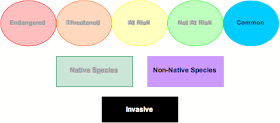Tuesday, July 3, 2012
North America's worst perennial garden plant
Species name: Aegopodium podagraria
Common name: goutweed, bishop's weed, ground elder
Location: Ontario
This species of plant is native to Eurasia, likely somewhere near Estonia, Lithuania, etc., and it gets its common name from the superficial likeliness of the leaves to elder. This doesn't speak to the relatedness of the two plants, however; ground elder is actually most closely related to the common carrot! This plant is incredibly invasive, and if given the opportunity will completely strangle out any native ground cover over a vast area. It reproduces underground through the use of rhizomes, produces seed (if conditions are right) that contain inhibitory chemicals to other species' seed germination, and produces such dense, thick growth that no other plant can grow up through it (and thus inhibiting the germination and growth of tree seedlings). It is also very resilient to shading by other species, and can grow up through a variety of soil covers (gravel, woodchips, mulch, and sometimes even that gross horticultural fabric some people put down to inhibit weed growth). Many countries have labeled this plant as the worst perennial garden plant, and some have even banned its sale.
So is there anything good that can be said about this plant? Well, there are three different species of moth and butterfly that use this plant as food for their larvae, but it's not their exclusive food source so an alternative that is less toxic to the environment in general can be found. It was historically a popular source of leafy greens in the Middle Ages (the young leaves; the older leaves have a somewhat laxative effect and should be used sparingly if at all), and has been used medicinally for hundreds of years (hence its other common name, goutweed). Monks in England used this plant in a warm wrap to treat the effects of arthritis (and hence it's third common name, bishop's weed).



No comments:
Post a Comment